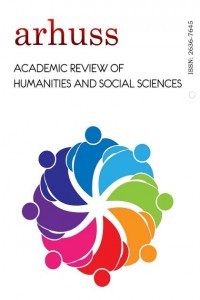ABD YAPTIRIMLARININ VE COVİD19 PANDEMİSİNİN İRAN EKONOMİSİNE ETKİSİ
Uluslararası arenada hükümetler, ulusal amaç ve çıkarlarını gerçekleştirmek için maddi veya manevi farklı yolları tercih etmektedirler. Ayrıca bu araçlar, rekabetçi hükümetlerin kritik çıkarlarını dolaylı olarak etkilemekte ve bu onların davranışlarını değiştirmelerine neden olmaktadır. Uluslararası ilişkilerde güç kullanımının azaldığı veya hükümetlerin seçeneği daha dikkatli kullandığı bir çağda, diğer has sas alanları etkileme yolları değişti, örneğin yaptırım. Nükleer programı nedeniyle İran'a uygulanan yaptırımlar, İran'ın diğer ülkelerle olan ilişkilerini ve ulusal çıkarlarını etkilemiştir. Bu yaptırımlar nedeniyle İran başta Avrupa ülkeleri olmak üzere birçok ülke ile ilişkisini kaybetmiştir. Ek olarak, pandeminin ekonomik sonuçları açıkça olumsuzdur. Hastalık yayılmasına neden olabilecek iş ilişkileri de bu durumdan olumsuz etkilenmektedir. Bu arada, pandemi, uzun bir hızlı küresel entegrasyon döneminin son aşamasını baltalıyor. Küresel ekonomi 1910'larda olduğu gibi zarar görmeyecek olsa da, geleceğin tarihçileri şaşırtıcı bir şekilde pandemiye, nihayetinde yeni bir küresel ticaret çağına yol açan küreselleşmenin sonuçlarından biri olarak değineceklerdi r. Bu çalışma tanımlayıcıanalitik bir tasarım benimsemiştir ve bunu yapmak için SPSS Yazılımı (sürüm 19) kullanılmış ve anket formları İran'ın sanayi sektörlerinin yöneticilerinden ve uzmanlarından oluşan istatistiksel bir popülasyona dağıtılmıştır. Bu ça ABD yaptırımlarının ve COVIDlışma, 19 pandemisinin İran ekonomisi üzerindeki etkisini incelemeyi amaçlamaktadır. Sonuçlar, ABD yaptırımlarının ve COVID19'un küçük ve orta ölçekli sanayilerin yönetim, üretim ve geliştirme performansı üzerinde önemli bir e tkisi olduğunu gösterdi.
Anahtar Kelimeler:
yaptırım, pandemi, dinamik ekonomi, iş ilişkileri, küreselleşme
IMPACT OF US SANCTIONS AND COVID-19 PANDEMIC ON IRANIAN ECONOMY
In international arena, governments opt for different means, either material or immaterial, to realize their national goals and interests. In addition, these means impact the competitive governments’ critical interests indirectly and this causes them to change their behavior. In an era when use of force in international relations has declined or governments use the option more carefully, the ways of affecting other sensitive realms has changed an instance of which is sanction. The sanctions imposed on Iran due to its nuclear program have impacted Iran’s relationship with other countries and its national interests. Due to these sanctions, Iran has lost its relationship with many countries especially European ones. In addition, economic consequences of the pandemic are clearly negative. Business relations which could cause disease spread are also negatively impacted by this situation. Meanwhile, the pandemic is undermining the last stage of a long period of rapid global integration. Although global economy will not be damaged like it was back in 1910s, future historians will unsurprisingly refer to the pandemic as one of the consequences of globalization which ultimately led to a new era of global business. This study adopted a descriptive-analytical design and to do so, SPSS Software (version. 19) was used and questionnaire forms were distributed in a statistical population which consisted of managers and experts of industrial sectors of Iran. This study aims to review the impact of US sanctions and COVID-19 pandemic on Iranian economy. The results suggested that US sanctions and COVID-19 have a significant impact on performance of management, production and development of small and medium industries.
Keywords:
Sanction, Pandemic, Dynamic Economy,
___
- Asgarkhani. A. M. (2016). International sanctions regime. Collection of Speeches in Symposium of US Sanctions against Iran, Political and International Research Center, Tehran. Dadwal, S. R., & Rizvi, M. A. (2010). US Sanctions on Iran and their Impact on India.
- Gheorgh R. Eliza (2017). The Boomerang Effect: The Effectiveness of Sanctions Againest Iran, Romania Energy Center Special Reaport. Hadadi. M. (2017). International sanctions, national policy tool with international executive guarantee. Legal Thoughts Journal, No.3.
- Hakim, Sam R. & Rashidian, Manochehr (2016) Properties, Linkages, and the Impact of Sanctions on the Tehran Stock Exchange June
- Huntington, S. P. (2000). The clash of civilizations? In Culture and politics (pp. 99-118). Palgrave Macmillan, New York.
- Institute International Pour (2018). Impact of sanctions on Iranian people healthcare, September Version 1.1
- Irvani. A. Saiid. (2016). Sanctions and international punishments. Department of Foreign Policy Studies, Strategic Research Center.
- Mafi. H. (2016). “An analysis of US economic sanctions against Iran from perspective of international law”, Law and Political Science Research Journal, no.1. Mearsheimer, John (2009). Reckless States and Realism, International Relations, Vol. 23, No. 2, pp. 241-256, June
- Momtaz, J. (2018). Comparison of economic sanctions of UN Security Council with human rights and humanitarian international laws, Quarterly of Law, Journal of Political Science and Law, University of Tehran, no. 4.
- Momtaz, J. (2018). Economic sanction and international public law. Journal of Law and Political Science Department, University of Tehran, no.22. Pesaran, M. H., & Shin, Y. (1996). Cointegration and speed of convergence to equilibrium. Journal of econometrics, 71(1-2), 117-143
- Rezaii. A. (2018). China and soft balance against US hegemony in international system. Journal of Development Strategy, no.4.
- Shenna, J. C. (2010).
The Case Against the Case Against Iran: Regionalism as the West’s Last Frontier . Middle East Journal, 64(3), 341–363. http://www.jstor.org/stable/40783104 - Torabi. M & Vesali. S. (2019). Impacts and consequences of banking sanctions on economy. World of Economics Newspaper, No.1960.
- ISSN: 2636-7645
- Yayın Aralığı: Yılda 2 Sayı
- Başlangıç: 2018
- Yayıncı: Bursa Teknik Üniversitesi
Sayıdaki Diğer Makaleler
ABD YAPTIRIMLARININ VE COVİD19 PANDEMİSİNİN İRAN EKONOMİSİNE ETKİSİ
Abdülkadir GÜMÜŞ, Hamid NABİLOU, Muhsin HALİS
EŞİTSİZLİĞİ YENİDEN ÜRETEN GÖSTERİ: THE PLATFORM VE SQUID GAME
SOSYAL MEDYA KULLANIMI VE KENDİNİ TANITMANIN SEYAHAT FOTOĞRAFI PAYLAŞMAYA ETKİSİ
Şükran KARACA, Murat KEMERCİ, Züleyhan BARAN
